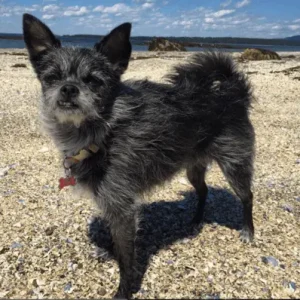Bichon Frisé History/Origin
Bichons are part of the Barbichon group of small white dogs, including the Bolognese, Havanese, and Maltese. These breeds are believed to have developed in Tenerife, the largest of the Canary Islands. One dog breed, the Bichon Tenerife, became particularly popular with sailors and is the primary ancestor of today’s Bichon Frise.
The breed’s connection with European royalty began in the 13th century, with Bichons becoming favorites in the royal courts of Spain, Italy, and France during the Renaissance. However, their status declined after the French Revolution in 1789, as many of their noble owners were imprisoned or executed, leaving the Bichons to fend for themselves.
Bichons History- Source: AKC.org
Street performers adopted the agile and trainable dogs, turning them into circus performers. In the 20th century, Bichons faced hardships due to the world wars but were saved by dedicated fanciers in France and Belgium. This purebred was recognized by the Société Centrale Canine in 1933 as the Bichon à Poil Frisé.
The Bichon Frise Club of America was founded in San Diego, United States in 1964, and the American Kennel Club recognized the breed in the Miscellaneous class in 1971, with full breed recognition in the Non-Sporting Group following in 1973.
Bichon Frisé Personality
A cheerful attitude is an outstanding trait of Bichon’s personality. This dog loves to be loved, enjoys being the center of attention, and is adept at charming his family, neighbors, groomer, or veterinarian with his winning personality.
- Bichon Frise Temperament
The Bichon has a playful, independent streak, but that doesn’t mean he likes to be alone. This breed hates being alone and commonly suffers from separation anxiety if left alone for many hours. In such situations, Bichons may become destructive, chewing and tearing up anything in sight.
- Potential Challenges
Despite their cheerful disposition, Bichons can present challenges for inexperienced owners. Their strong attachment to their families can lead to separation anxiety, which manifests as destructive behavior when left alone for extended periods.
Additionally, their fluffy white coats require regular grooming to prevent matting and maintain their characteristic appearance, which can be time-consuming and costly. Bichons are also prone to certain health issues, such as allergies and dental problems, necessitating regular veterinary care and attention to their diet and grooming routines.
Proper training and socialization are crucial to channel their intelligence and playful energy positively, ensuring they develop into well-behaved and happy companions.
Bichon Frisé Physical Appearance
The Bichon Frise has a small, sturdy, and compact build, with a medium bone structure that strikes a balance between coarse and fine. Its dense, white coat resembles a fluffy powder puff, contributing to its distinctive appearance. The breed moves with a lively gait, holding its head high and carrying its plumed tail gracefully over its back.
- Size
Male and female Bichon Frises typically measure between 9 to 11 inches in height at the shoulder and weigh approximately 7 to 12 pounds. Their small stature and light weight contribute to their agile and sprightly movement, reflecting their lively and playful nature.
- Coat color
The Bichon Frise sports a double coat that is always white. It features a soft, dense undercoat and a slightly coarse outer coat, giving it a plush and substantial texture. The coat stands away from the body, creating the breed’s signature powder-puff appearance.
White Bichon Frise- Source: Pixabay
Bichon Frisé Gender Differences
In Bichon Frises, physical differences between males and females are minimal or nonexistent. Both genders typically exhibit similar size and appearance characteristics.
However, where they do differ noticeably is in temperament. Females often display a more assertive and expressive personality compared to males, while males can sometimes be more laid-back or easygoing. These temperament variations can influence how they interact with their owners and their overall demeanor in different situations.
Bichon Frisé Feed/Nutrition
Feed your adult Bichon Frise between 1/2 to 1.5 cups of high-quality dry food daily, split into two meals. The amount of food needed varies based on your dog’s size, age, metabolism, and activity level.
Just like people, dogs have individual nutritional needs, so adjust portions accordingly. Opt for high-quality dog food as it provides better nutrition, and requires less quantity.
Maintain your Bichon’s health by measuring meals and feeding him twice daily instead of free-feeding throughout the day. You can also occasionally offer mango as a treat, ensuring it’s served in moderation and without the pit or skin.
Bichon Frisé Health Problems
Bichons are generally healthy, but like all breeds, they are susceptible to certain health issues. Not every Bichon will develop these conditions, but it’s crucial to be aware of them when considering this breed. When purchasing a puppy, ensure the breeder provides health clearances for both parents.
- Bladder Problems: Bladder stones and infections can occur, often due to dietary factors or infrequent urination. Symptoms include frequent urination, bloody urine, difficulty urinating, and loss of appetite.
- Allergies: Bichons are prone to allergies, including contact allergies and food allergies, often sensitized to fleabites. Symptoms may include excessive scratching, licking paws, or rubbing the face.
- Patellar Luxation: Common in small dogs, this condition involves the dislocation of the kneecap, causing pain and potential mobility issues.
- Hip Dysplasia: An inherited condition where the thighbone doesn’t fit properly into the hip joint, potentially leading to pain and arthritis. X-ray screening is essential for diagnosis.
- Liver Disease: Bichons may be prone to liver diseases, which can manifest in symptoms like jaundice, lack of appetite, vomiting, or abdominal pain. Regular veterinary check-ups and a balanced diet are essential for liver health.
- Tooth Pathology: Dental issues such as tartar buildup, gum disease, and tooth decay can affect Bichons. Regular dental care, including brushing their teeth and veterinary dental check-ups, is crucial to preventing these problems.
- Juvenile Cataracts: These can develop early in Bichons and are believed to be hereditary. Ensure breeding stock is certified by CERF when purchasing a puppy.
Bichon Frisé Care and Grooming
Bichons are lively and enjoy playtime, making them suitable for apartment living with adequate exercise. They thrive on interaction and shouldn’t be left alone for extended periods. Crate training can help prevent destructive behavior when you’re away from home, ensuring their safety and comfort.
Regular grooming is crucial for Bichons due to their non-shedding double coat, which requires frequent attention to prevent matting and skin problems. Brushing should occur at least twice a week, with baths scheduled as needed to maintain their pristine white coats.
Keep a close eye on their ears for cleanliness and signs of infection, seeking professional assistance if necessary. Professional grooming every four to six weeks ensures their hygiene is well-maintained, including nail trimming, ear cleaning, and overall coat care.
Regular dental care and eye cleaning are also essential for their health and appearance. Additionally, leash training your dog from a young age is important to ensure smooth walks and proper behavior on outings.
Bichon Frisé Rescue Groups
Rescuing a Bichon Frise offers a chance to provide a loving home to a dog known for its affectionate nature. Many Bichons in rescues are seeking new homes due to changes in their owners’ circumstances. Adopting from a rescue gives these dogs a fresh start and offers you a loyal companion ready to share love and joy in your household.
How Much Does Bichon Frise Cost?
The price of a Bichon Frise typically ranges from $500 to $2,500, depending on factors such as breeder reputation, pedigree, and location.
When looking to purchase Bichon Frise puppies, it’s crucial to find a reputable breeder who prioritizes their dogs’ health. Look for breeders who provide health clearances for genetic conditions like hip dysplasia and eye disorders. Responsible breeders also ensure their puppies are well-socialized, preparing them for life in a new home.
Interesting Facts
- During the 14th century, Italian sailors encountered the Bichon Frise in the Canary Islands, where they were struck by its charm and beauty.
- Barbra Streisand has owned a Bichon Frise.
Barbra Streisand – Source: Pinterest
- They have appeared in the show At Westminster.
- Bichon Frise is featured in “The Secret Life of Pets”.
The Secret Life of Pets- Source: IMDb
Best For
Bichon Frises are best for individuals or families who have time for regular grooming and enjoy an active, playful pet. They thrive in households where they receive plenty of attention and companionship.
Top Names
| Male Bichon Frise Names | Female Bichon Frise Names |
| Max | Bella |
| Charlie | Daisy |
| Teddy | Luna |
| Oliver | Zoey |
| Milo | Sophie |









 Bichons History- Source:
Bichons History- Source: 

 White Bichon Frise- Source:
White Bichon Frise- Source: 
 Barbra Streisand – Source:
Barbra Streisand – Source:  The Secret Life of Pets- Source:
The Secret Life of Pets- Source: 






